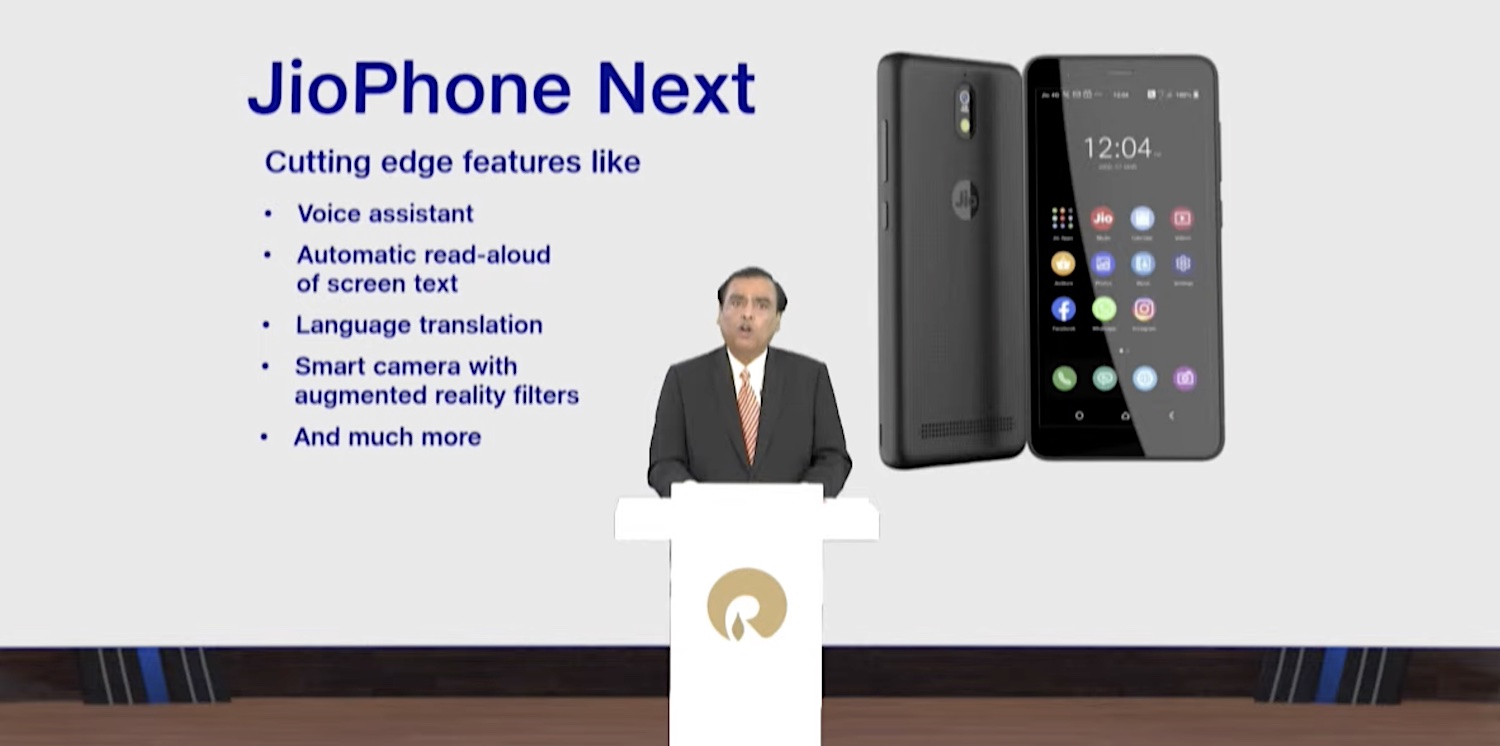Jio Platforms, run by India’s richest man (Mukesh Ambani), and Google on Thursday unveiled the JioPhone Next, an affordable Android smartphone, as the top Indian telecom operator and the American giant make further push to expand their reach in the world’s second largest internet market.
The Indian firm, which secured $4.5 billion investment from Google (and another $15.5 billion from Facebook and others) last year and shared plans to work on low-cost smartphones, said the JioPhone Next is aimed at helping roughly 300 million users in India who are still on 2G network upgrade their gadget to access faster networks.
The phone, which is “powered by extremely optimized Android” mobile operating system, will first launch in India on September 10 ahead of the festive season in the country, and will eventually be made available outside of India, said Mukesh Ambani, chairman of Reliance Industries, at its annual general meeting Thursday.
The JioPhone Next will be an “ultra-affordable 4G smartphone,” claimed Ambani, though he didn’t reveal the price or the hardware specifications of the handset.
In a virtual appearance at Reliance AGM, Google CEO Sundar Pichai said the company has also entered into a 5G cloud partnership with Jio Platforms. “It will help more than a billion Indians connect to a faster and better internet, support businesses in their digital transformation, and help Jio build new services in sectors like health, education and more — laying a foundation for the next phase of India’s digitization,” said the chief executive of Google, which last year committed to invest $10 billion in India.
As part of the 5G cloud partnership, Google is also winning a major Google Cloud customer in Reliance, said Pichai.
“They will be able take advantage of Google’s AI and machine learning, e-commerce, and demand forecasting offerings. Harnessing the reliability and performance of Google Cloud will enable these businesses to scale up as needed to respond to customer demand,” he added.

Ambani unveils the JioPhone Next at Reliance’s Annual General Meeting on Thursday.
The JioPhone Next will ship with a range of features, including Read Aloud and Translate Now that will work with any text on the phone screen, including web pages, apps, messages, and even photos.
It also features a “fast, high-quality camera” which will support HDR, and the JioPhone Next will be protected by latest Android releases and security updates, Google said, though it didn’t share the precise duration for this coverage. (Smartphone vendors typically offer security and new Android software support for about two years after the launch.)
“We have worked closely with the Jio team on engineering and product development on useful voice-first features that enable these users to consume content and navigate the phone in their own language, deliver a great camera experience, and get the latest Android feature and security updates,” Google said in a statement.
Even as most smartphones that ship in India, the second largest market, are priced at $150 or less, customers looking for a smartphone priced under $100 are left with little choice. And that choice has shrunk in recent years.
Research firm Counterpoint told TechCrunch that the sub-$100 smartphones accounted for just 12% of the Indian smartphone market, down from 18% in 2019 and 24% in 2018. Sub-$50 smartphones represented just 0.3% of the entire market in 2020, down from 4.3% in 2018.
Smartphone makers are aware of this whitespace in the market, but have found it incredibly challenging to meet the demand. Some, including Jio Platforms earlier explored a range of feature phones to reach people in small cities and towns of India. Jio Platforms’ KaiOS-powered feature phone, called JioPhone, had amassed 100 million customers as of late February this year.
In a recent report to clients, analysts at UBS said that after factoring in the recent price surge of memory component, any smartphone priced at or under $50 is likely selling at cost.
“While this move by Jio will accelerate 2G to 4G migration, we evaluated how interesting this space would be for other smartphone manufacturers, especially key players like Xiaomi. Xiaomi, the unit market leader in smartphones in India, is unlikely to follow up with a $50 smartphone, in our view,” they wrote in the report, obtained by TechCrunch.
Google, too, has previously made several efforts — $100 Android One smartphones program in 2014 and low-resource intensive Android Go operating system in 2017 — to expand the reach of Android. The company has also backed KaiOS, which powers popular feature phones.
The JioPhone Next is a “momentous step in our Android mission for India, and is the first of many that our Android product and engineering teams will embark on in India,” Google said in a statement. “We are also actively expanding our engineering teams in India, as we continue to work on finding ways to answer the unique needs of India’s smartphone users.”
"Android" - Google News
June 24, 2021 at 05:37PM
https://ift.tt/3jdCQGD
Google and India’s Jio Platforms announce budget Android smartphone JioPhone Next - TechCrunch
"Android" - Google News
https://ift.tt/336ZsND
https://ift.tt/2KSW0PQ
Bagikan Berita Ini














0 Response to "Google and India’s Jio Platforms announce budget Android smartphone JioPhone Next - TechCrunch"
Post a Comment